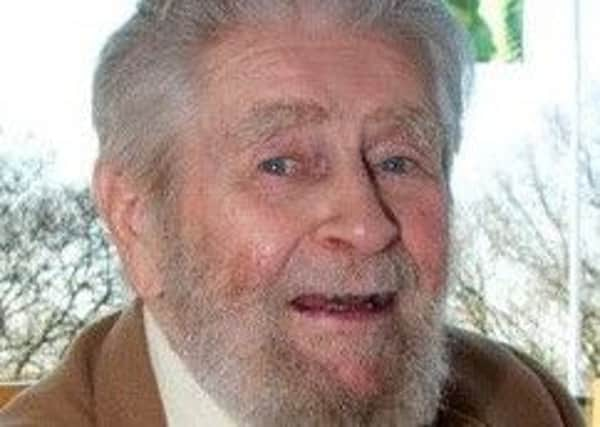Obituary: Jim Forrester, journalist, teacher and charity worker


One of the last survivors of a golden age of journalism has died at his home in Edinburgh. Former Reuters night editor Jim Forrester saw news-gathering evolve from clattering teleprinters and exotic foreign postings to today’s digital blizzard of instant news and opinion.
But he was more than a passive recorder of events. A strong moral sense led him and his wife, Bertha, to found a UK branch of the charity SOS Children’s Villages. He served as an unpaid and temporary chief executive of the British arm for ten years in the 1960s and 1970s.
Advertisement
Hide AdAdvertisement
Hide AdHe joined Reuters news agency in 1960 when Fleet Street was the pinnacle of British journalism, and worked in London, where he was overnight editor for 18 years, and then in Hong Kong.
Nicknamed The Prince of Darkness for his nocturnal duties, his career with Reuters spanned the rise and fall of the Iron Curtain, as the boundary of the Soviet bloc was then called.
He was in what was then Czechoslovakia for first anniversary of the “Prague Spring”, where he and Bertha stayed at the home of a writer friend.
Not wishing to draw official attention to his host’s address, Jim asked him to name a local landmark where taxi drivers could drop him off in the evenings. After several days, Forrester was picked up by the authorities. The landmark building whose address he had been giving to taxi drivers turned out to be the headquarters of the secret police.
During that visit, Forrester helped cover the massive anniversary demonstrations in the Czech capital. At the peak of the disturbances, authorities called out the militia and three ranks of bayonet-wielding men closed off the foot of Wenceslas Square. Returning to the office, Bertha, a teacher, marched up to the first rank, said very loudly “Excuse me”, firmly brushed aside the fixed bayonets and walked through the rest to the Reuters office without a second glance.
In his role as night editor, he recalled in later years how a young correspondent in Berlin saw a huge build-up of military vehicles in the eastern sector and filed an urgent and alarming message. When the reporter made contact shortly afterwards to ask why the story had not been transmitted, Forrester told him to look at a calendar. It was the day before May Day – by tradition, the day for big military parades.
Jim Forrester was born and educated in Whitehaven, Cumbria, where as a youngster he met Beatrix Potter. He struggled in later years to square his memory of the sheep-breeder in stout farm boots with the image of the creator of the Peter Rabbit tales.
During the Second World War he joined the Fleet Air Arm, where he was badly injured in a crash while training as a pilot in 1945. He recalled later that he made a landing which would have been perfect … had the plane only been closer to the ground.
Advertisement
Hide AdAdvertisement
Hide AdAfter this mishap he transferred to the army and served as an education instructor in the Cameronians. He later recalled how army discipline was less demanding than the tough naval regime of the Fleet Air Arm.
During his army service in 1946 he developed an illness which was cured by penicillin, for which he personally thanked Alexander Fleming, rector of Edinburgh University in the early 1950s. Forrester had masterminded his rectorial campaign.
After leaving the army he resumed his studies at Edinburgh University, was active in a national Labour student body, and taught extra-mural classes for both Edinburgh and Glasgow universities.
He worked briefly in Edinburgh in advertising sales, and also as a college lecturer in Cumbria before joining The Scotsman.
His first published article was in The Spectator in 1949 and can still be read in its online archive. It compares the different visions for an atomic future held by physicist Niels Bohr and the organisers of an exhibition about the new Windscale nuclear plant, later to be renamed Sellafield.
His journalistic career began with a flourish soon after he gave up a job as a lecturer in Cumbria.
He had signed a contract for a six-month teaching post at Broxburn High School, West Lothian and was about to take this up when he happened to visit Edinburgh.
He left his distinctive Austin Sheerline car parked outside The Scotsman building in North Bridge while he visited Patrick Thomson’s department store. When he returned to his car he saw a note on the windscreen from a friend saying that if he still wanted to be a journalist, he should come in and meet the editor.
Advertisement
Hide AdAdvertisement
Hide AdHe was offered a job as a subeditor, working shifts that began at 6pm. But he was still saddled with his teaching contract so he did two jobs – teaching at Broxburn by day and working at The Scotsman in the evenings.
The young journalist was visiting his parents in Cumbria when a fire broke out at Windscale. Many of the press conferences were restricted to the local media, but as he knew many of the people associated with the plant, he got a flying start to his journalism career.
He retired from Reuters in 1991, returning to live in his adopted home city of Edinburgh. But he remained active, filing for Reuters on events as varied as the quest for the Lockerbie bomber to a by-election campaign in Kincardine and Deeside. He was also a regular reviewer at the Edinburgh festivals.
He helped promote the annual Indian Chef of the Year contest, founded in 1991 by Edinburgh entrepreneur Tommy Miah. Forrester’s astute publicity skills established it firmly as an annual event after its launch at the House of Commons in 1991 by Edwina Currie who had just resigned as a government minister.
His wife Bertha died in 2012 aged 81. They had no children but were much loved by their friends and relatives.